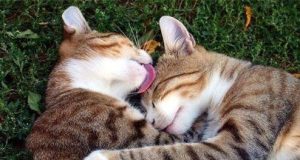Cats are known for their meticulous grooming habits, but there’s more to their fur-licking behavior than just staying clean. Here are five key reasons why cats lick their fur, along with additional insights to help you better understand your feline friend.
1. Stress Relief
-
Licking fur can be a self-soothing behavior for cats. When they’re anxious or stressed, licking helps redirect their attention and calm themselves down. It’s similar to how humans might bite their nails or fidget when nervous. If your cat starts licking more than usual, consider if there have been recent changes in the environment that might be causing stress, such as moving to a new home or the addition of a new pet or family member.
2. Health Issues
-
Excessive licking in one area can indicate skin problems like parasites, infections, or allergies. If you notice your cat persistently licking a specific spot, check for signs of redness, swelling, or irritation. A visit to the vet may be necessary to address any underlying health concerns.
3. Social Bonding
-
Mutual grooming is a sign of affection and trust among cats. Cats who get along well often groom each other as a way to strengthen their bond. However, some cats may not enjoy being groomed by others, so it’s important to respect each cat’s individual preferences.
4. Nutritional Needs
-
Cats may lick their fur to ingest nutrients, especially vitamin D, which is produced when their fur is exposed to sunlight. If your cat is licking excessively due to nutritional deficiencies, consult your vet about appropriate supplements.
5. Natural Instinct for Cleanliness
-
Cats are naturally clean animals and lick their fur to remove dirt, loose hair, and maintain their coat’s health. This behavior is instinctual and helps them stay comfortable and free from parasites.
Additional Information
-
Over-Grooming: While grooming is normal, excessive licking can lead to hair loss or skin damage. Monitor your cat’s grooming habits and consult a vet if you notice any changes.
-
Age Factors: Kittens and older cats may groom more frequently. Kittens are learning grooming behaviors, while older cats might groom less due to arthritis or other health issues.
-
Environmental Enrichment: Provide your cat with a stimulating environment to reduce stress-related grooming. Toys, climbing structures, and interactive play can help keep your cat mentally and physically healthy.
By understanding these reasons and providing appropriate care, you can support your cat’s well-being and ensure their grooming habits remain healthy.

